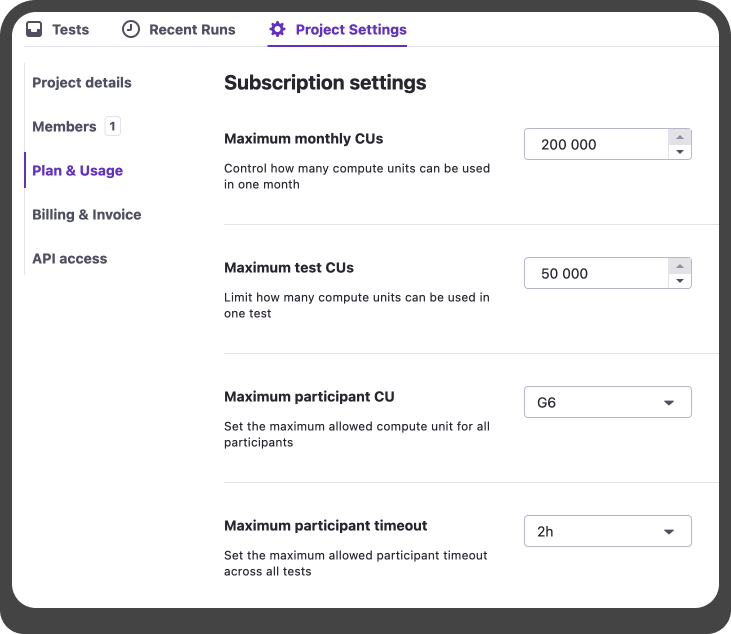Welcome back to Loadero’s monthly updates! As we didn’t have as much to share last month, this time we are coming to you with updates from the past two months.
Before we get into product updates, we are very excited to announce that Loadero is now ISO certified and we have acquired ISO 9001 (Quality Management), ISO/IEC 27001 (Information Security), and ISO 22301 (Business Continuity) certifications! These certifications prove our internal processes to be up to industry standards and emphasize the attention to detail we pay in every step of the process.
Personalized subscription limitations
We have implemented a way for users to introduce self-imposed limitations to projects, for example, to assist in sticking to a predefined budget. You can use these settings to manage your spending, for example, limiting the total compute units you might spend in a month or maximum compute unit assigned to a participant. The settings that you can configure are as follows:
- Maximum monthly CUs – this setting limits how many compute units are permitted to be spent in any one month. Any test run that would exceed this limit will not be able to be launched, e.g., if the setting is 1000 CUs and you have already spent 990 CUs, you will not be able to launch a run that consumes more than 10 CUs.
Note that setting a limit lower than 10k, while possible, has no functional use for Monthly/Yearly plans, as the 10k CUs are already covered by the base invoice – additional expenses only start being incurred above 10k CUs.
- Maximum test CUs – this setting limits how many compute units are permitted to be consumed in a single test run. Any test that is set up to consume more than this value will not be allowed to launch, e.g., if the setting is 100 CUs and the test is configured to spend 120 CUs, you will not be able to launch a run for this test. This can assist you in preventing large invoices from accidents where you set a much larger participant count than you had intended (an extra 0, for example).
- Maximum participant CU – this setting limits the maximum compute unit you can set for any one participant, e.g., if the setting is set to G2, then running tests with G4/G6 participants will not be possible.
- Maximum participant timeout – this setting limits the maximum participant timeout you can set for any one test, e.g., if the setting is set to 15 minutes, then running tests with a participant timeout of 20 minutes will not be possible.
You can find these newly available subscription settings in Project Settings’ Plan & Usage tab.

Note that this functionality is accessible only to project members with the Administrator role. Additionally, if a setting is already set to its maximum permitted value and the project’s plan is changed to something that has a higher maximum permitted value, then this setting will be auto-set to this new limitation. Settings lower than the maximum permitted value shall be preserved.
Various UI and UX improvements
This month we have deployed several changes to the UI, this includes:
- Improving the process of changing a plan’s project to be more intuitive and streamlined.
- Improved user experience for logging in, creating an account, and resetting your password, including minor changes to how the errors/warnings regarding these actions are generated and presented to the user, all while improving overall security of Loadero;
- Search functionality in the test builder’s Participants and Asserts tabs no longer being case sensitive;
- Better formatting for the Time Execution metrics table in the run report;
- Resolving an issue where clicking a collapsed group in the test builder would expand it only sometimes, depending on where the click was made. Now clicking anywhere on a collapsed group will expand it.
- Many other Quality-of-Life changes.
Stability and performance improvements
We have implemented some mechanisms to increase the stability of run initialization. The processes for instance spin-up have been adjusted to ensure lesser likelihood that a test run will have problems during the initialization phase.
Additionally, we have increased the speed at which result statistics are retrieved. The effects of this will mostly be tangible by those using the API to receive results for very large run reports. While this does assist the loading times in the app as well, there is still some optimization work ahead to consistently reduce these loading times for the app.
API documentation updates
To those of you who use the Loadero API, you may be pleased to know that we have started taking the first steps in improving our Swagger documentation. The first resources to be affected are groups, files, and asserts. All documentation for endpoints concerning these resources have been touched up, so that the endpoints’ purpose is clearer. There are also elaborations available on what the purpose of each parameter is.
Support for new browser versions
As per usual, we have maintained the availability of new browser versions within the week of their appearance. This month we have added support for:
- Google Chrome 118 and 119;
- Mozilla Firefox 119 and 120.
That concludes this month’s updates, see you again next month!



